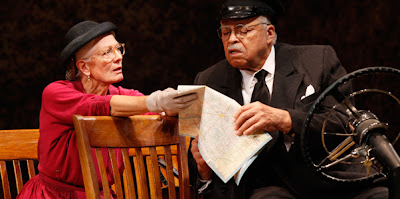Driving Miss Daisy and I go back a long way. I saw the original 1987 off-Broadway production with Dana Ivey as the titular Jewish widow in post-War Atlanta and Morgan Freeman as the black man her son hires to be her chauffeur. This small 90-minute play about the unlikely friendship that develops between them over the following two decades was not only a crowd-pleaser that ran for over three years but won that year’s Pulitzer Prize for Drama. And I not only saw the 1989 Academy Award-winning movie version, which also won Oscars for Jessica Tandy, who took over the role of Daisy, and Freeman, who reprised his role as the chauffeur Hoke, but I actually got the chance to spend a morning talking about all of it with Freeman.
The revival currently playing at the Golden Theatre has upped the horsepower by recruiting Vanessa Redgrave and James Earl Jones to play Daisy and Hoke. I am always grateful to see Redgrave on a stage and delighted to have Jones get the chance to show once again that his acting chops run deeper than just giving voice to Darth Vader and pitching stuff on TV (“Is he still the voice of CNN?” the woman behind me asked her companion minutes before the curtain went up. “How much do you think he gets paid for that?”). And yet this time, I was much less charmed by Driving Miss Daisy than I was back in the ‘80s.
Of course, I’ve changed. And the times have changed too. But I think the main reason I feel differently is that the whole good-black-servant genre has just worn out its welcome with me. I know that most of the plays, movies and books that deal with this subject are well-intentioned. And I know that they’ve given work to a lot of black actors who would have had far fewer roles to play without them. But I don’t care if it’s Whoopi Goldberg in the movie “Ghost,” the maids Aibileen and Minny in Kathryn Stockett’s bestselling novel “The Help” or the maid Caroline in the Tony Kushner-Jeanine Tesori musical Caroline, or Change, I’m tired of stories about black people helping white people find their humanity.
Isn’t it time we find some other ways for blacks and whites to interact? The good-servant trope has become so endemic in our culture that the benevolent black character has been labeled the “magic Negro.” Say what you will about David Mamet’s Race (and I didn’t have a lot nice to say about it when I saw it last season) at least he tried something different. As did John Guare with A Free Man of Color, his play about race relations in New Orleans right before and after the Louisiana Purchase which limped to the end of its limited run this past Sunday.
Now, I know that the producers of Driving Miss Daisy couldn’t change a 23 year-old script any more than Alfred Uhry can change the memories of his grandmother that originally inspired the play (click here to listen to an interesting interview he did on Downstage Center). So once the decision was made to go ahead with the show, that placed an extra burden on the director and actors to take the play beyond the familiar territory.
Director David Esbjornson tries to do that by framing the play as a memory of Daisy’s son Boolie, who is played by the always-superb Boyd Gaines. And Esbjornson has enlisted Wendall K. Harrington to provide video projections that supply added context about the Civil Rights Movement (in fact, the projections seem to have taken up the entire design budget because the rest of the set is extremely modest for a Broadway show, with chairs doubling as Miss Daisy's various cars). But none of that is enough.
Back in 1987, Freeman brought a cagy edginess to his portrayal of Hoke, an undercurrent that gave audiences a visceral sense of the frustrations and humiliations that simmered behind the placid faces of black men in the South during those years. You felt the anger and the anguish when he gave the “I’m a man” speech after Miss Daisy’s benign racism has pushed Hoke too far.
Jones is cuddlier and funnier in the role; his version of the speech seemed more like a mild temper tantrum than a wrenching cri de couer. Redgrave goes for the warmth and humor too (click here to listen to them discuss the play). I craved more of the subtext, the recognition of what that friendship (and I know such relationships exist) cost them both.
But, despite my reservations, their approach seems to be a winning one. While plays with younger and hotter stars (Brendan Fraser’s Elling, A Life in the Theater with Patrick Stewart and T.R. Knight) closed early, Driving Miss Daisy has recouped its investment and extended its run through April 9. The audience the night my sister Joanne and I saw the show was clearly charmed by it. But I think there was a reason that there were so few black faces among them.

2 comments:
I couldn't agree more, though I haven't seen this particular version (mostly for that very reason). I saw the movie in high school and found myself bored and vaguely annoyed by it. And, because I was 14, I didn't think about it too deeply, I realize now this is exactly why. It's a played-out and somewhat offensive trope. 99seats, over on Parabasis, posted a similar (although slightly more scathing) critique a couple months ago, which I also appreciated.
Thanks for leaving this comment, Leigh. It's really much appreciated. And thanks, too, for referring me to the 99seats post. I'm a fan of his and I'm not sure how I missed this one.
Post a Comment